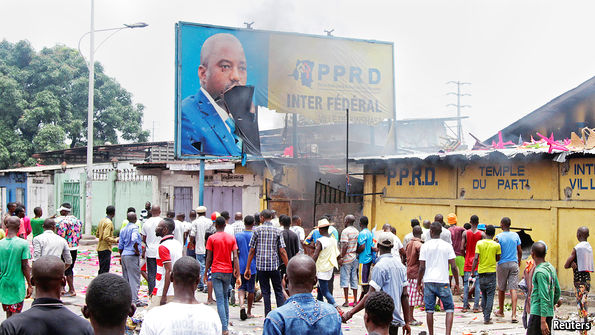 Kabila’s not going anywhere
Kabila’s not going anywhereFROM the outside, the offices of FONUS, a political party in Congo’s capital, Kinshasa, look relatively unchanged. The gate is still in the blue and yellow colours of the national flag; the party president’s picture still hangs in the doorway. Inside, however, is chaos. Two large printing machines have been turned into a pile of blackened and twisted metal. The corrugated iron roofing is on the floor. A party member explains how at 3am on September 20th two jeeps full of soldiers arrived, broke in and poured petrol everywhere. Then one of them fired a rocket into the printing room.
The FONUS office was not alone. The road it sits on, opposite the national football stadium, is lined with buildings festooned with political flags and posters. Several of them, all from opposition parties, now have smashed windows and blackened walls. They were attacked after a protest on September 19th against President Joseph Kabila’s failure to organise elections. That turned into a looting spree, which was in turn put down with bullets by Mr Kabila’s personal guards. Around 50 people were killed; two police officers were lynched in the street. It was an unhappy taste of what the Democratic Republic of Congo may face as Mr Kabila comes to the end of his second and supposedly final term in office.
The crisis in Congo has been building for some time. In 2006 Mr Kabila, who took power after the assassination of his father Laurent in 2001, became Congo’s first elected president since 1960. He helped write a new constitution, limiting a president to two five-year terms. Since then, he has apparently changed his mind. After trying, and failing, twice to change the rules to allow him to run again, Mr Kabila has opted for a strategy of “glissement”, or slippage. He has refused to organise elections, citing logistical problems, while manoeuvring to stay in power after his term ends on December 19th.
Not many people in Congo much like the president. Conspiracy theories fly that he is not really Congolese, or not really his father’s son. Educated in Tanzania, he speaks Lingala, the language of the Kinshasa street, poorly. And he is rarely seen in public: on September 26th he appeared for the first time since the protests: in Rome, shaking hands with the Pope. He is particularly unpopular in Kinshasa, a filthy, buzzing mega-city of perhaps 13m people, where the economy is turning sour. “The misery is at a level we have never seen,” says Jean-Pierre Tshibangu, who runs a street stall selling milk, sugar and rice. “The government gives us nothing.”
Mr Kabila’s strategy for the past six months has been to try to buy off the opposition. The idea was to bring other parties into a “national dialogue” that would agree how to hold elections—and buy him another year or two as head of a “transitional government”. But so far the conversation has been rather one-sided, as Congo’s two biggest opposition figureheads have refused to join. In July Etienne Tshisekedi, an elderly politician who ran against Mr Kabila in 2011, returned from Belgium to Kinshasa to huge crowds, starting a new opposition alliance called Le Rassemblement (“The Rally”, in French). Moïse Katumbi, a flamboyant and wealthy former governor who fled Congo in May, is still abroad, but his money appears to be bankrolling opposition unity.
Worn away by weather and patience
What happens now depends on how the events of September 19th changed the bargaining power of each side. For the opposition, the protests proved that they can get people onto the streets and cause havoc. But Mr Kabila also showed that his personal security services remain loyal and will happily shoot at crowds. That may make it harder to get protesters out again, says Jason Stearns of the Congo Research Group, a New York-based outfit.
What the opposition hopes instead is to force Mr Kabila into new talks. Delly Sesanga, an MP who is an ally of Mr Katumbi, says that his group is willing to re-enter the dialogue on certain conditions. A new mediator must be appointed; political prisoners must be released; and charges against Mr Katumbi must be dropped. But crucially he says that Mr Kabila can stay as president if he agrees to organise elections in 2017, promises not to stand and gives up some day-to-day power.
According to Soraya Aziz, a campaigner for better governance, the opposition parties are probably hoping to get Mr Kabila to give them big jobs in government, in particular the post of prime minister. In Congo, that means access to money, and they hope to build war-chests for the eventual election. They hope that, with luck, they will then be able to eject the president.
It is possible that Mr Kabila will accept such a deal. He is already on the ropes economically, says one businessman: the money he needs to pay the salaries of the police could run out in months. Over the past year the local franc has lost 20% of its value against the dollar. On September 28th, two senior security officials were hit with American financial sanctions, freezing their assets. Others may follow. Making some concessions would buy Mr Kabila time, with which he could look for a new opportunity to change the constitution, or at the least to promote a successor who as president would protect his interests.
Mr Kabila has constraints of his own. Not all of his allies will want to risk giving up power meekly; some would probably prefer to shoot more protesters and lock up more opposition leaders than lose their seats. And not everyone in the opposition will compromise. Mr Tshisekedi, for example, wants to be president—and at 83, he cannot wait much longer. As Mr Kabila’s time runs out, this latest outburst of violence may just be the beginning of a round of bloody confrontations.